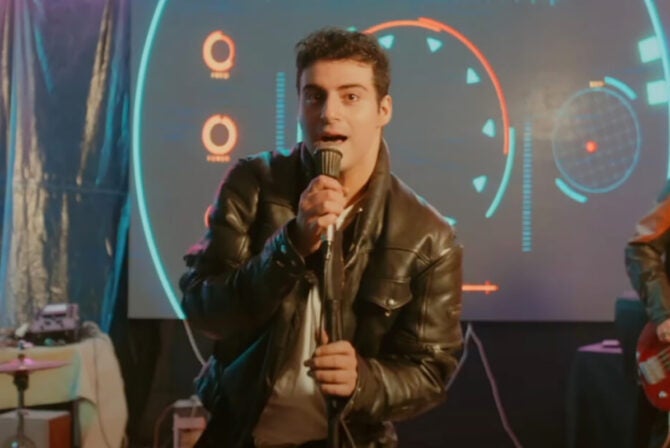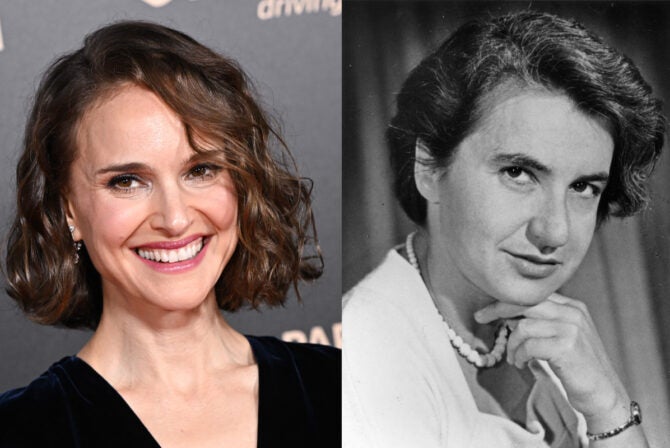There’s a picture of my saba (grandfather) and savta (grandmother) hanging in my living room. The same one that hung in my own house growing up. Their faces are wrinkled and neither of them is smiling. My saba’s leg rests against my savta’s knee, while my savta’s hand is clenched tightly in her lap. Filled with seeds for the hungry birds, my mother explained.
I have a few precious real life memories of them, too. Feeding stray cats in Israel with my savta, my saba’s warm hand on my head to bless me, my savta calling me “Lela Habiba” over and over.
The stories of my grandparents are legendary in my family. There’s the one about how my savta comforted women in the Italian concentration camps by reading their (always bright) future in tea leaves. Many of these women visited my savta later to tell her that her words are what got them through all the horrors.
There’s the one about how my saba, an entrepreneur turned rabbi, was renowned for his fertility blessings. He was always receiving gifts to thank him for his prayers and wise counseling.
And then there’s the one about how my savta (who gave birth to my mother on the long road to immigrate to Israel, when she was almost 50), became ill shortly afterwards. Because she couldn’t nurse my mother herself, she asked other nursing mothers to help–fellow Jews, Bedouins, Arabs. Because, even though she lived during a turbulent time in Muslim/Jewish history (was there ever a peaceful one?) all human life was valuable to her. In fact, she often went out of her way to befriend her Arab neighbors, sending them mishloach manot (gift bags) during Purim and always having an open door to anyone in need.
But, perhaps the most famous story of all is about the love my grandparents had for each other. The kind of love that only exists in fairy tales. My saba was a merchant traveling through Alexandria when he met my savta. Each day he’d come back to the bed and breakfast that her father owned to talk to her. One day, my savta (who wasn’t raised as religiously) used God’s name in vain. Although he was completely smitten with her, my saba spoke seriously to her about how important God and Judaism were to him.
That was the beginning of an endless love story.
Their lives together were almost unbearably hard. They lost multiple babies, were expelled from Libya, watched helplessly as their daughters were put into Italian work camps, made the long, difficult journey to Palestine after being expelled from Libya. And started over. In a brand new fledgling country. With nothing except the love that they had for each other.
In almost every picture, they are touching, their knees bumping gently together, his hand on her chin, her head on his shoulder.
My savta died when she was around 80, peacefully in her sleep, 20 years before my saba left to join her. During the time in between, my saba went blind, lost an adult daughter, and became so incapacitated that he required 24-hour care.
The last time that I saw him I was 10. My Hebrew wasn’t very good and he was blind and had a long white beard and a booming voice. Every time he called my name I resisted the urge to hide. But, he called to me and I came because he was my grandfather and I loved him even though he terrified me.
He sat by me and spoke for a long time in Hebrew, heavy with Italian and Arabic intonations. Words that I didn’t understand. When I asked my mom to translate later she told me that he’d spoken to me about my savta. About how special she was. About how she’d been such an angel that God had taken her before him. About how he was only human, and flawed, and how he wasn’t good enough to join her yet.
Those words didn’t make much sense to me as a 10-year-old girl, either in Hebrew or in English. But now, as an adult, I think about what that kind of love must have been like and I get chills.
Living in an age where people change partners all the time, I wonder what it was that kept my grandparents together through so many hard times. Not just together, but loving and so devoted to each other.
When I lived in Israel for a college semester, I used to sleep in the house where my grandparents lived. Every night before I fell asleep I’d say a prayer that they would come to me in a dream and tell me their secret to lasting love.
They never did.
But as I’ve gotten older, I’ve realized that the one constant in every story I’ve heard about my grandparents is their love, not only for each other, but for their family, their community, and the world as a whole.
Is it possible that that’s the real secret? That, instead of feeding off of some airy idea of romance, they loved each other because of the good that they saw each other doing in the rest of the world? That that initial spark they felt was ignited over and over again by the world around them, by the love around them?
I can never know for sure what the real answer is. But, what I do know is that every year around Valentine’s Day when I hear endless commercials about how to express your love through fancy bouquets and diamonds, I feel a pang of sadness in my heart.
In a world that values materialism over mitzvot, social media over real friendships, plastic hearts over true devotion, I hope that real love can still thrive.












